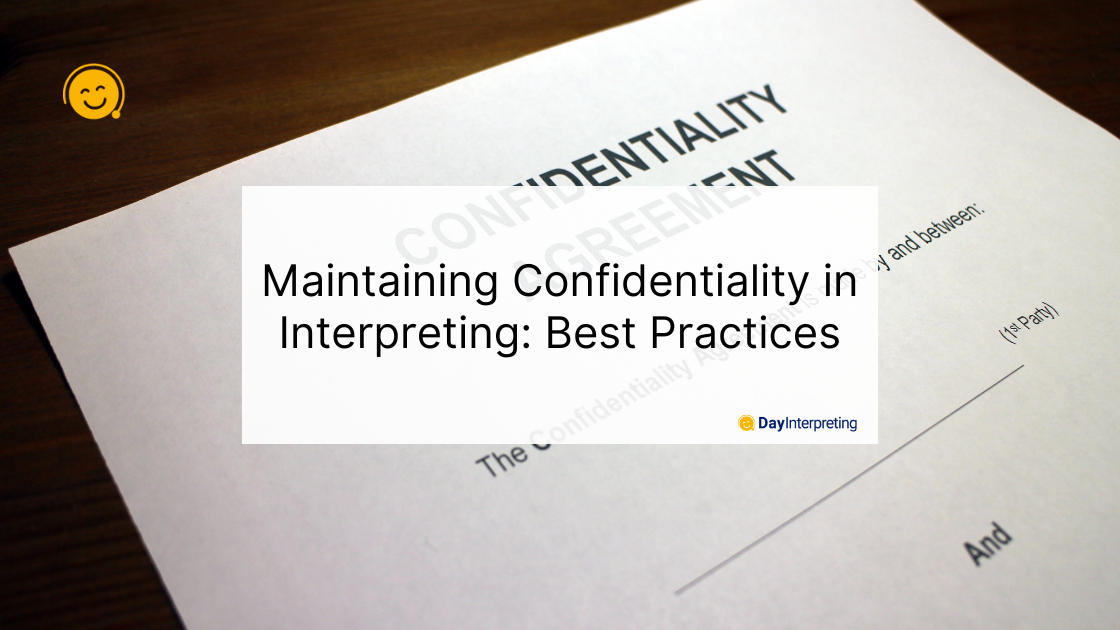In a world marked by globalization and cultural diversity, the role of interpreters is more vital than ever. Professional interpreters bridge language barriers as they facilitate communication across borders and cultures. However, with great power comes great responsibility, and one of the most crucial responsibilities of interpreters is maintaining confidentiality in interpreting when handling sensitive information. In this comprehensive guide, we will explore the best practices for professional interpreters to ensure they uphold the highest standards of confidentiality.
The Interpreting Balancing Act
Interpreters are often privy to sensitive conversations, from legal proceedings and medical consultations to business negotiations and personal counseling. The nature of their work demands a delicate balance between linguistic proficiency and ethical considerations. The cornerstone of this balance is confidentiality.
Understanding the Importance of Client Confidentiality in Interpreting
Confidentiality is not just an ethical principle; it is a legal obligation in many cases. Breaching confidentiality can have severe consequences, including lawsuits, damaged relationships, and even criminal charges. Moreover, it erodes trust – a cornerstone of effective communication. Here are some best practices for interpreters to ensure they maintain confidentiality and uphold the trust placed in them.
1. Familiarize Yourself with Ethical Codes
Interpreters are guided by ethical codes that set forth standards of conduct. Familiarize yourself with the code relevant to your field, such as the RID (Registry of Interpreters for the Deaf) Code of Professional Conduct or the AIIC (International Association of Conference Interpreters) Code of Ethics. These codes provide a strong foundation for ethical decision-making.
2. Informed Consent
Ensure that all parties involved in the interpretation process understand the importance of confidentiality and grant informed consent. Make it clear that you will not disclose any information shared during the interpretation, and encourage them to speak openly, knowing that their privacy is protected.
3. Professional Development
Continuously invest in your professional development. Attend workshops, seminars, and courses on interpreting ethics and confidentiality. Staying informed about the latest best practices will help you make informed ethical decisions.
4. Mind Your Environment
Choose a location that ensures privacy and minimizes the risk of eavesdropping. If you are interpreting remotely, use secure communication platforms and advise your clients to do the same. Protecting the physical and digital space is fundamental to maintaining confidentiality.
5. Neutral Language
Interpreters must remain neutral and avoid becoming emotionally involved in the conversation. Emotional involvement can lead to unintentional breaches of confidentiality. Maintain a professional, dispassionate stance, regardless of the content of the conversation.
6. Note-Taking
Consider using note-taking techniques that focus on key concepts rather than verbatim transcription. This minimizes the risk of retaining sensitive information and helps you maintain a professional distance from the content.
7. Limitations and Boundaries
Know your limitations. If you feel uncomfortable or unqualified to interpret certain content, communicate this to the parties involved and withdraw from the assignment if necessary. Maintaining your professional boundaries is paramount to upholding confidentiality.
8. Handling Confidential Documents
If you are required to interpret written documents, ensure that you handle them securely. Avoid making copies and, if possible, return the documents to the client immediately after the interpretation is complete.
9. Post-Interpretation Responsibilities
After the interpretation session, destroy any notes you took and any digital records you may have generated. This helps ensure that sensitive information is not inadvertently exposed.
10. Seek Guidance
If you encounter a challenging ethical dilemma, seek guidance from experienced colleagues or your interpreting association’s ethics committee. Consulting with others can provide valuable insights and help you make ethical decisions.
Final Thoughts
Interpreters play a pivotal role in facilitating communication, and their commitment to confidentiality is the bedrock of trust in their profession. Upholding confidentiality standards is not just a legal requirement; it is a moral imperative. By following these best practices, interpreters can ensure that they maintain the highest standards of confidentiality, fostering trust and effective communication in an increasingly interconnected world. In doing so, they continue to be the unsung heroes of cross-cultural understanding and cooperation.





0 Comments